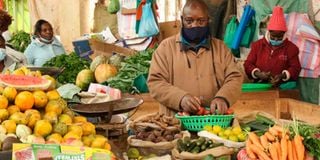Premium
Lucy Kiruthu: Why Africa food business holds out good prospects

Mr Kariuki Gatiba sorts out groceries at Nyeri town market on June 9, 2021.
We all need to eat. Food businesses are at the core of human survival. The food business is quite expansive. There are thousands of businesses involved in the food value chain. These include those involved in the production, processing as well as selling of food items. The processing of food helps link production and consumption.
On one end are the farmers and other agricultural producers that provide the food items. On the other end are consumers who purchase the food whether for further preparation or as ready-to-eat. Both fresh produce and processed foods often require further preparation before eating. The ready to eat market too has its players; I have in mind the food hawkers, restaurants, bakeries, cafes and many others.
Many food items require some form of processing whether at home or in the factory. If eaten raw, they might require some sorting, cleaning, packaging and distribution. There are many activities surrounding the feeding of a nation, the continent and the world. I have had a special interest in the world of food and especially in its processing. Maybe because my career started in the food industry.
Food businesses
In Kenya, in Africa and across the world I have observed food businesses grow. I have also observed other food businesses merge and others disappear. I believe the food sector is an interesting one for anyone in business to watch. It presents humongous opportunities for Africa! I wonder whether local investors will take advantage or whether big multinationals will dominate the industry into the future.
In Africa, we import and export food items. Overall, we remain a net importer of food. This is attributable to many different factors. For example, Africa’s population continues to grow, rural to urban migration is increasing, the middle class is expanding and the post-harvest losses remain worrisome.
Processing food
There are several large multinationals processing food in Africa. Top of the mind are the likes of Nestle Foods, Unilever, and Diageo in Kenya.
Food manufactured elsewhere is also selling in Africa and this number seems to be growing. A listing of the top 100 Food Business in Africa makes an interesting read. The list highlights both international and local brands. Food companies founded in Africa have been penetrating borders. In addition, multinationals are still seeking to enter Africa and take advantage of the evolving sector.
I had the opportunity to chat with Francis Juma, an expert on matters food businesses in Africa and the editor of Food Business Africa magazine.
According to Juma, Africa is at the start of a food revolution and the food industry prospects are great. Mr Juma added that the industry is yet to fully deal with the challenges of access to affordable and nutritious foods.
Mr Juma further mentioned that there has been lots of activity in the sector as more investors take interest in the double-digit growth industry. His final word was that the sector is likely to have more activities in the next nine years than witnessed in the last three decades.
I am confident that by 2030, the food business in Africa will have taken a new shape!
Connect via Twitter @KiruthuLucy




